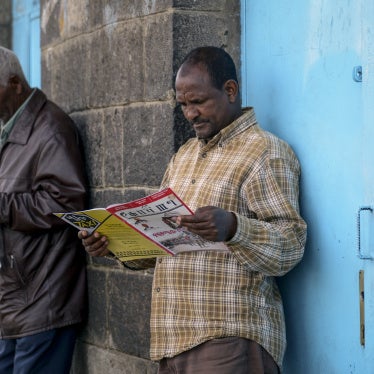(Johannesburg) - The Southern Africa Development Community (SADC) should publicly press President Robert Mugabe of Zimbabwe and his party to end their harassment and arbitrary arrests of civil society activists and political opponents, Human Rights Watch said today. The SADC is meeting beginning March 31, 2011, in Livingstone, Zambia.
President Jacob Zuma of South Africa, who was appointed by the SADC in 2009 to facilitate the Global Political Agreement between Mugabe's party, ZANU-PF, and the Movement for Democratic Change (MDC) to create Zimbabwe's inclusive government, is expected to report back on the status of the agreement and progress by the parties to carry out key political reforms. His report will be made to SADC's Organ on Politics, Defense and Security Cooperation, also referred to as the "troika."
"As Zimbabwe prepares for elections, ZANU-PF and the security forces are again harassing human rights activists and MDC members," said Daniel Bekele, Africa director at Human Rights Watch. "SADC leaders should no longer just stand by and watch as the situation in the country deteriorates."
The inclusive government has recently been racked by disagreement, as the two MDC factions, in particular, have grown frustrated with their lack of power in the government. ZANU-PF controls the military, the security sector, and all major governmental appointments. In December 2010 President Mugabe declared that he and ZANU-PF were ready to leave the power-sharing government and run for elections.
In recent months, Zimbabwe's security forces have intensified harassment and arbitrary arrests of human rights activists and MDC officials and supporters. On March 15, police raided the offices of the nongovernmental organization Crisis in Zimbabwe Coalition, allegedly in search of "subversive" material. The organization said that four police officers from Harare Central Police station raided the offices and later searched the home of the coalition's director, Mcdonald Lewanika. Police confiscated several reports and other materials from both places and then took Lewanika to Harare Central Police station, where he was charged with criminal nuisance and made to pay an admission-of-guilt fine of US$20.
On March 10, police visited the offices of another human rights organization, the Zimbabwe Human Rights NGO Forum, and demanded to see Abel Chikomo, the director, who was not there.
In February, police arrested two human rights workers from the organization as they carried out research on transitional justice issues. They were released without charge on the same day. Chikomo was summoned to Harare Central Police station on the following day; he was not questioned about any apparent criminal investigation but instead about the organization's activities.
On March 10, police without a warrant disrupted a meeting organized by Zimbabwe Lawyers for Human Rights and Youth Dialogue Network and arrested and detained Owen Dhilwayo and Catherine Mukwapati, human rights workers from Youth Dialogue Network in Chinhoyi, Mashonaland West province. The meeting was organized to train human rights defenders on human rights and constitutional government. The two were detained and interrogated for four hours, then released without charge.
On February 19, six civil society activists, including a labor activist, Munyaradzi Gwisai, were arbitrarily arrested by police and are facing charges of treason and attempting to overthrow the government by unconstitutional means for viewing a video of the popular uprisings in North Africa and the Middle East. The six, who were among 45 people arrested at the meeting, spent three weeks in custody before they were released on bail. The activists told their lawyers that they were beaten, tortured, and kept in solitary confinement.
"SADC leaders should not tolerate ZANU-PFs endemic abuse against civil society," Bekele said. "They should insist on tangible human rights improvements in Zimbabwe before any elections are held."
In recent weeks, MDC officials have also been subjected to increasing harassment and arbitrary arrests. On March 13, police raided the MDC party headquarters and arrested three MDC officials and seven MDC youth activists on assault charges. Three days later, they were all released without charge. Several MDC members of parliament and officials are also facing various criminal charges, including inciting and participating in violence that appears to be politically motivated.
On March 10, police arrested Elton Mangoma, the energy and power development minister and an MDC member, on charges of criminal abuse of duty. He was accused of ordering five million liters of diesel fuel from a South African company without following tender procedures. The minister was released on bail five days later after a high court judge ruled that the state's case against Mangoma lacked concrete evidence and that Mangoma seemed to have been acting in the national interest to address the country's fuel crisis.
"The myriad criminal charges brought against MDC officials and activists seem to be politically motivated," Bekele said. "They indicate that ZANU-PF has resorted to its old campaign tactics of suppressing political opponents by harassment and intimidation."








